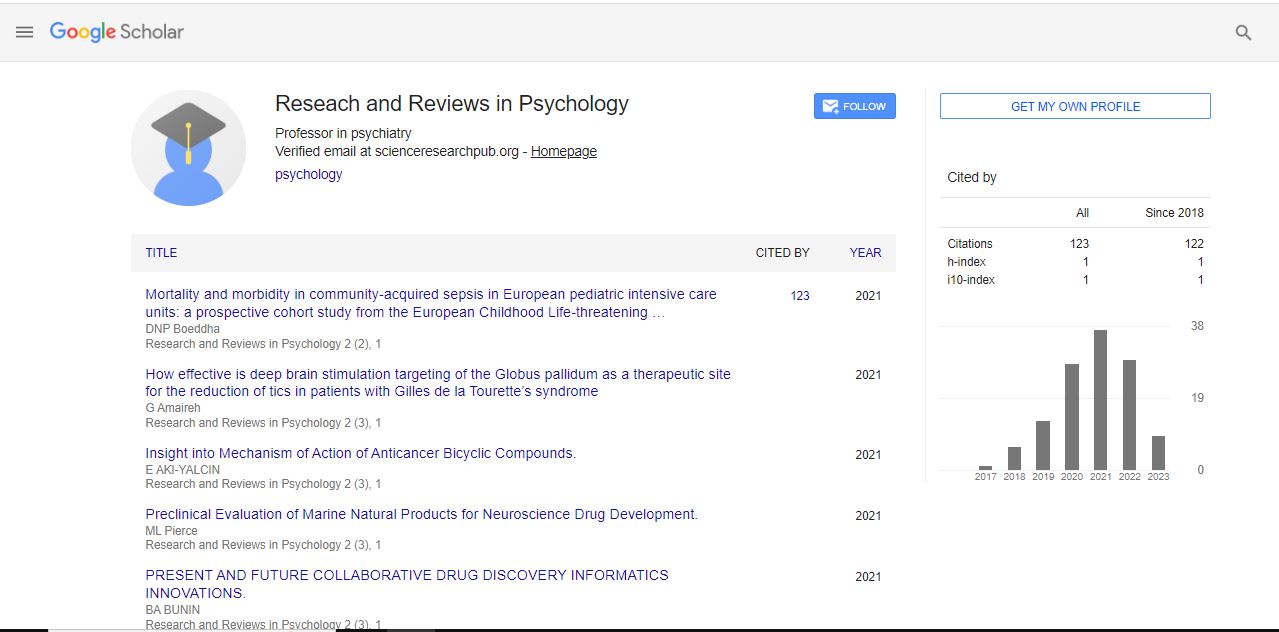Commentary, Res Rev Phys Vol: 4 Issue: 2
Cognitive Aging: Dynamics of the Aging Mind
Junjie Jiang*
1Department of Psychology, Peking University, Beijing, China
*Corresponding Author: Junjie Jiang,
Department of Psychology, Peking
University, Beijing, China
E-mail: jiang@jun.cn
Received date: 24 May, 2023, Manuscript No. RRPY-23-107401;
Editor assigned date: 26 May, 2023, PreQC No. RRPY-23-107401 (PQ);
Reviewed date: 09 June, 2023, QC No. RRPY-23-107401;
Revised date: 16 June, 2023, Manuscript No. RRPY-23-107401 (R);
Published date: 23 June, 2023 DOI: 10.4172/rrpy.1000337
Citation: Jiang J (2023) Cognitive Aging: Dynamics of the Aging Mind. Res Rev Phys 4:2.
Description
Cognitive aging, a natural process that occurs as individuals grow older, brings about changes in cognitive abilities and mental processes. This study explores the fascinating field of cognitive aging within the realm of psychology, focus on the cognitive changes that accompany aging, the factors influencing cognitive decline, and the strategies individuals can employ to promote healthy cognitive aging.
Cognitive changes in aging
Cognitive aging encompasses a range of changes in cognitive abilities. While certain cognitive functions remain relatively stable, others show a decline with age. Memory is one of the most affected domains, with difficulties in episodic memory (recall of specific events) and working memory (temporary storage and manipulation of information). Processing speed and attentional control may also decrease, impacting information processing efficiency and the ability to focus on relevant stimuli.
Multiple factors contribute to cognitive decline in aging. Biological factors, such as genetic predispositions and age-related changes in brain structures and neurochemical systems, play a significant role. Structural changes, including decreases in brain volume, changes in neural connectivity, and the accumulation of abnormal proteins, can affect cognitive functioning. People are extremely worried about memory loss and loss of their capacity for making decisions as they get older. They may also be concerned about whether these reductions are precursors to a neurodegenerative disease, notably Alzheimer's disease. They could worry that cognitive aging will cause them to lose their independence and experience a reduction in their health and quality of life. Factors influencing cognitive decline.
Lifestyle factors, including physical exercise, diet, and engagement in cognitively stimulating activities, can influence cognitive aging.
Regular exercise has been associated with better cognitive performance and reduced risk of cognitive decline. A healthy diet rich in fruits, vegetables, and omega-3 fatty acids may also promote cognitive health. Furthermore, engaging in mentally stimulating activities, such as reading, puzzles, and social interactions, can help maintain cognitive abilities. Psychosocial factors, such as education level, social support, and psychological well-being, have an impact on cognitive aging. Higher education levels and intellectual engagement throughout life are associated with better cognitive outcomes in later years. Strong social networks and social interactions contribute to cognitive resilience. Psychological well-being, including positive mood and low levels of stress and depression, is linked to better cognitive functioning.
Promoting healthy cognitive aging
Although cognitive decline is a natural part of the aging process, there are strategies individuals can adopt to promote healthy cognitive aging. Engaging in regular physical exercise, such as aerobic activities or strength training, has been shown to enhance cognitive function and preserve brain health. Maintaining a balanced and nutritious diet, including foods rich in antioxidants and omega-3 fatty acids, can also support cognitive well-being. Continued mental stimulation is important. Challenging the brain through activities like reading, puzzles, learning new skills, or engaging in intellectually stimulating hobbies helps maintain cognitive abilities.
Social interactions and participation in social activities contribute to cognitive resilience, as social engagement exercises cognitive processes and provides emotional support. Managing stress and maintaining psychological well-being are vital for cognitive health. Strategies such as relaxation techniques, mindfulness, and seeking support from friends or professionals can help mitigate the negative impact of stress on cognitive functioning. Regular check-ups and monitoring of overall health are essential. Managing chronic conditions, such as hypertension, diabetes, or heart disease, can help reduce the risk of cognitive decline. Adequate sleep and avoiding unhealthy habits like smoking and excessive alcohol consumption also support cognitive well-being.
Conclusion
Cognitive aging is a complex process influenced by various biological, lifestyle, and psychosocial factors. While some cognitive functions decline with age, individuals can take proactive steps to promote healthy cognitive aging through physical exercise, mental stimulation, social engagement, stress management, and overall health maintenance. By adopting these strategies, individuals can enhance their cognitive well-being and maintain an active and fulfilling lifestyle as they age.
 Spanish
Spanish  Chinese
Chinese  Russian
Russian  German
German  French
French  Japanese
Japanese  Portuguese
Portuguese  Hindi
Hindi 